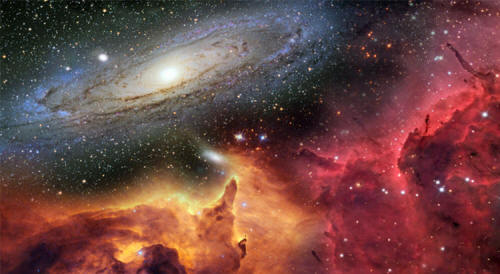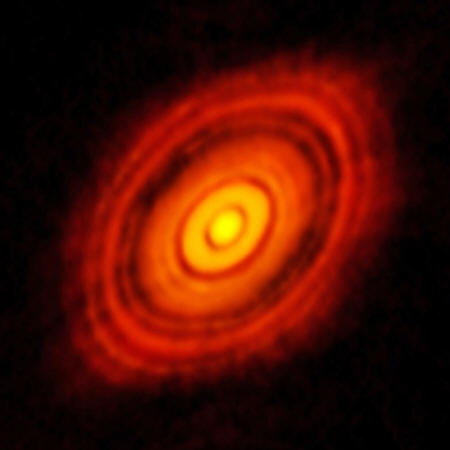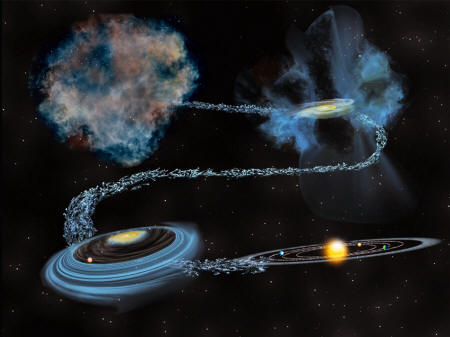|

by Alec Cope
March 23, 2015
from
Collective-Evolution Website

So far, life as we know it has needed one ingredient to survive:
water.
This primordial and basic compound is
essential for life on this planet, and
a new study shows it is most likely
very abundant in the Universe. Ilse Cleeves and Ted Bergin
at the University of Michigan wanted to understand the true origin
of water on our planet.
There are two different theories on this
topic:
-
Molecules on ice comets collided
into the Earth and volcanoes on the (then barren) planet
Earth all added to one another to give rise to new
terrestrial oceans,
or,
-
Water originated before the
solar system which then inherited it.
The Experiment

Image of the planetary disk HL Tauri
Cleeves' and Bergin's experiment (actually a simulation) shows that
the origin of perhaps 50 percent of our water is a result of
something that predates not only the solar system, but the sun as
well.
The duo were attempting to find the
ratio of "common" water and "heavy" water in our present day solar
system, compared to before the solar system even formed. Heavy water
comes from a very cold source, apparently a few degrees above
absolute zero, and stars (like our own) eliminate the residuals of
this primeval water.
The simulation started by "winding the clock back" on the solar
system to before there even was a solar system.
They then allowed the simulation to play
itself out for "millions of years," or the typical lifetime of a
planetary disk. Planetary disks are rotating "rings" full of debris
and are thought to be the origin of planetary systems.
After the millions of years had passed, they found that the chemical
processes in the disk were inefficient at making heavy water
throughout the solar system.
What this implies is that if the
planetary disk didn't create the water, then some of it had to have
been inherited.
Astronomer Ted Bergin was quoted as
saying:
"Based on our simulations and our
growing astronomical understanding, the formation of water from
hydrogen and oxygen atoms is a ubiquitous component of the early
stages of stellar birth.
It is this water, which we know from
astronomical observations forms at only 10 degrees above
absolute zero before the birth of the star, that is provided to
nascent stellar systems everywhere."
Cleeves added:
"The implications of these findings
are pretty exciting, if water formation had been a local process
that occurs in individual stellar systems, the amount of water
and other important chemical ingredients necessary for the
formation of life might vary from system to system.
But because some of the chemically
rich ices from the molecular cloud are directly inherited, young
planetary systems have access to these important ingredients."
So what do you make of these findings?
Does this mean that the life-giving nature of water is an abundant
substance throughout our Universe and has spawned life?
Whatever the case may be, this is a very
exciting revelation!
The Water in your Bottle Might Be...
Older than The Sun
by Nicole Casal Moore
September 25, 2014
from
UniversityOfMichiganNews Website

University of
Michigan researchers
have theorized that
up to half of Earth's water
is older than the
sun.
It likely formed in
the cold molecular cloud
that spawned our
solar system.
Image credit: Bill
Saxton, NSF/AUI/NRAO
NRAOANN ARBOR
Up to half of the water on Earth is
likely older than the solar system itself, University of Michigan
astronomers theorize.
The researchers' work, published in the current issue of Science,
helps to settle a debate about just how far back in galactic history
our planet and our solar system's water formed.
-
Were the molecules in comet ices
and terrestrial oceans born with the system itself - in the
planet-forming disk of dust and gas that circled the young
sun 4.6 billion years ago?
-
Or did the water originate even
earlier - in the cold, ancient molecular cloud that spawned
the sun and that planet-forming disk?
Between 30 and 50 percent came from the
molecular cloud, says
Ilse Cleeves, a doctoral
student in astronomy at the U-M College of Literature, Science, and
the Arts.
That would make it roughly a million
years older than the solar system.
To arrive at that estimate, Cleeves and
Ted Bergin, a professor of
astronomy, simulated the chemistry that went on as our solar system
formed. They focused on the ratio of two slightly different
varieties of water - the common kind and a heavier version.
Today, comets and Earth's oceans hold
particular ratios of heavy water - higher ratios than the sun
contains.
"Chemistry tells us that Earth
received a contribution of water from some source that was very
cold - only tens of degrees above absolute zero, while the sun
being substantially hotter has erased this deuterium, or heavy
water, fingerprint," Bergin said.
To start their solar system simulation,
the scientists wound back the clock and zeroed out the heavy water.
They hit "go" and waited to see if eons
of solar system formation could lead to the ratios they see today on
Earth and in comets.
"We let the chemistry evolve for a
million years - the typical lifetime of a planet-forming disk -
and we found that chemical processes in the disk were
inefficient at making heavy water throughout the solar system,"
Cleeves said.
"What this implies is if the
planetary disk didn't make the water, it inherited it.
Consequently, some fraction of the water in our solar system
predates the sun."
All life on Earth depends on water.
Understanding when and where it came
from can help scientists estimate how common water might be
throughout the galaxy.
"The implications of these findings
are pretty exciting," Cleeves said.
"If water formation had been a local
process that occurs in individual stellar systems, the amount of
water and other important chemical ingredients necessary for the
formation of life might vary from system to system.
But because some of the chemically
rich ices from the molecular cloud are directly inherited, young
planetary systems have access to these important ingredients."
Bergin added,
"Based on our simulations and our
growing astronomical understanding, the formation of water from
hydrogen and oxygen atoms is a ubiquitous component of the early
stages of stellar birth.
It is this water, which we know from
astronomical observations forms at only 10 degrees above
absolute zero before the birth of the star, that is provided to
nascent stellar systems everywhere."
|




